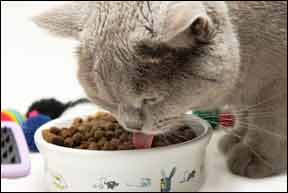Nothing can be more frustrating for a cat owner – and annoying to a cat – than skin disorders. Nutritional deficiencies or food hypersensitivity; parasites; fungal, viral and bacterial infections; and environmental allergens can cause problems that range from dry, brittle hair and coat to baldness and open wounds. “Most skin diseases are simple and straightforward,” says William Miller, Jr., 288 VMD, professor of dermatology at Cornell Universitys College of Veterinary Medicine, “and common problems such as flea bite allergies, abscesses and ear mites are easily recognized, treated and resolved.” If a cat can absorb the nutrients in food and is being fed a nutritionally complete diet, food is probably not the cause of the skin problem. If a cat has abnormal absorption or a gastrointestinal disease, or is being fed nutritionally inadequate home-cooked food or unbalanced “people” food, the problem may show up either as vomiting or diarrhea, or as skin disease. Detective Work. The more esoteric causes of skin disorders are allergies and these can often require some investigative diagnosis. “From a dermatologic point of view, we see allergic reactions more often than other skin problems,” says Dr. Miller. “And you cant always tell if you have an allergy to food, drugs, pollen or other sources.” Some cats have a genetic predisposition to allergic dermatitis caused by environmental allergens (atopy), and pedigreed cats have a higher predisposition than cats in the general population, according to Dr. Miller. Although allergies may be caused by flea bites or environmental stimuli such as grass pollens and ragweed, other causes may include food hypersensitivity. “Dust mites and storage mites in the environment can contaminate dry cat food,” says Dr. Miller. “These pose no health significance unless the cat is allergic to them.” No Quick Fix. If your cat has an allergy, treatment will alleviate the signs, but dont expect it to go away. “Allergies are forever,” says Dr. Miller. “They may vary in intensity, but they dont go away.” Your veterinarian will help you decipher the cause of your cats allergy and, if necessary, refer you to a specialist. Seeing a specialist may initially be more expensive – but it may save you money, time and frustration in the long run. “Some practitioners feel that skin problems are best resolved through a dermatologist,” says Dr. Miller. If your cats diet is fat deficient, the addition of a fatty acid supplement may help. A combination of the omega-3 fatty acids found in fish oil and the omega-6 fatty acids found in cereal grains acts like a low-level anti-inflammatory agent, making a cat less inclined to itch and scratch by decreasing the inflammatory molecules in the skin and replenishing its essential oils. “They act like a botanical aspirin,” says Dr. Miller. Although fatty acid supplements may be of benefit, they are not 100 percent effective. “They may help up to 50 percent of the cats,” says Dr. Miller. Too much fatty acid can have an adverse effect, so discuss adding supplements to your cats diet with your veterinarian and follow his advice on the amount. Some skin conditions improve when the cats eat a hypoallergenic diet targeted to cats with sensitive skin (such diets have added fatty acids and vitamin E). If your cat has itchy skin, Dr. Miller recommends that you try one of these diets. “It could take seven to 30 days to detect a positive response,” he says. Special diets are more expensive, and although helpful to some cats, they may not help a cat suffering from hair loss or a genetic predisposition to allergic reactions. If you try dietary modification and see no improvement within 30 days, see your veterinarian. A veterinarian may perform a complete blood chemistry, skin scrapings, allergy blood tests or intradermal allergy testing to determine the cause of the allergic reactions. Once the allergen is identified, removing it from the environment is the first step in treating the condition. If you would like to try feeding your cat a home-cooked diet, seek veterinary advice. Home-cooked food must be nutritionally balanced and complete to prevent other problems from developing.



